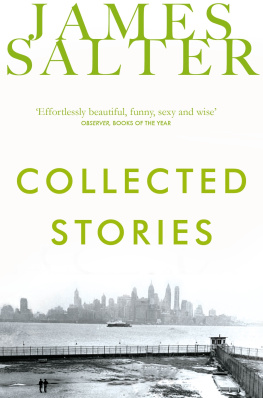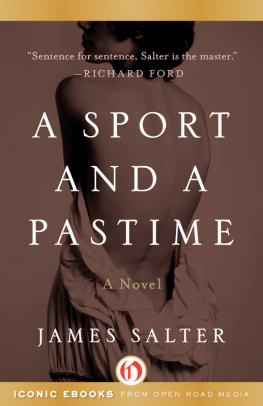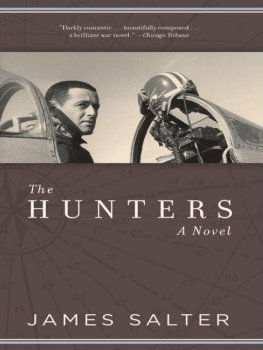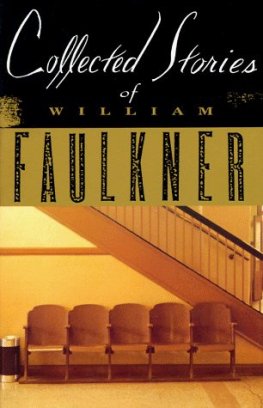
INTRODUCTION
Nothing in literature is more difficult than the depiction of commonplace reality. Only the greatest have succeeded in the task. In the novel form we think immediately of Flaubert, of the opening sections of Joyces Ulysses. Among short-story writers there is Chekhov, of course, and Joyce again in Dubliners. These wonderful artists do not write about reality: their work is reality itself. Reading them, we forget that we are experiencing a highly wrought and mediated version of the world. Emma Bovary dying; Leopold Bloom serving his wife breakfast in bed; the lady with the little dog falling haplessly in love and out and in again; Gabriel Conroy staring into the snowy wastes of his marriage and of his selfhoodall this strikes us with the force of lived life, immediate, graspable, at once mundane and sublime.
James Salter is probably best known as a novelist. Two of his books, A Sport and a Pastime and Light Years, are classics of the form. This year, at the age of eighty-seven, he has published All That Is, a big ambitious novel about war and the life of soldiers after war, about writing and publishing, about America and Europe, about love and the loss of love. It is a spellbinding work that a writer half Salters age would be proud of producing. And now, too, comes this magnificent collection of his short stories, drawn from two slimmish volumes, Dusk and Other Stories and Last Night, published in 1988 and 2005 respectively. There is also, as a splendid treat, a brand-new story, Charisma, on which the ink is hardly dry. In these stories Salter shows himself to be a master chronicler of quotidian lives.
He was born James Arnold Horowitz in 1925, in New Jersey. His father was a real estate broker and a former soldier. Young Horowitz, following his fathers distinguished example, entered West Point military academy at the age of seventeen. That was in the summer of 1942, when the world was hard at war. He was an assiduous student and graduated with honours in 1945. The story here, evocatively titled Lost Sonsthe opening of which strikes an eerie echo with Joyces tale of youths wildness, After the Raceevokes with staccato pointedness and dispatch a West Point reunion:
In the reception area a welcoming party was going on. There were faces that had hardly changed at all and others like Reemstmas whose name tag was read more than once. Someone with a camera and flash attachment was running around in a cadet bathrobe. Over in the barracks they were drinking. Doors were open. Voices spilled out.
This is the kind of writing Salter does superlatively well. The pace is headlong but at intervals a detail will spring upReemstmas name tag being read more than onceon which the readers attention snags, like a fingernail snagging on silk. It is not only Reemstmas awkward name that sets him apart. Having left the academy he became a painter, and now, returned briefly to the old school, he reflects with brooding melancholy upon the life that might have been: A wave of sadness went through him, memories of parades, the end of dances, Christmas leave.... It was finished, but no one turns his back on it completely.
Salter is that rarest of phenomena, a man of action turned successful, more than successful, artisthis is the career that Hemingway could only dream of. At West Point he trained as a pilot, was stationed in the Philippines and Japan, and after post-graduate studies at Georgetown University, he was assigned to the Tactical Air Command. A couple of years later he volunteered to serve in the Korean war, and underwent training in flying the F-86 Sabre fighter jet. In Korea he flew more than a hundred combat missions. His first two novels, The Hunters (1957) and The Arm of Flesh (1961), drew on his wartime experiences. These books were prentice work, and in later life he was scathingly critical of themalthough he republished The Arm of Flesh in 2000, under the new title Cassada.
In all, Salter served for twelve years in the Air Force, and a further three or four in the Air Force Reserve, before quitting the military life to become a full-time writer. That must have been a tough decision. He was a born flyer, and the thrill of combat was in his blood. Also he was married, with two young children. His early work was not well received either by publishers or the reading publiche was already acquiring that most dreaded of labels, a writers writer. Despite this handicap he threw himself into the marketplace, and began to write films. As for so many of his predecessors and peers, this proved a dispiriting experience. The story The Cinema, with its sardonically portentous title and jump-cut style, catches the disenchantment perfectlyYes, notes, make notes, a director urges his leading man, I am saying some brilliant things. A script that Salter had written for Robert Redford was rejected, and the author turned it into a novel, Solo Faces (1979). It was an apt metamorphosis, and marked the end of Salters time in the movies.
The years in which Salter gave up the life of action in favour of literature marked a fascinating transformation in America at large. The excitements and certainties of wartime had been exchanged for the harsh realities of civilian life. Women, who during the war had enjoyed hitherto undreamed-of freedoms, in the workplace, in the home and in bed, had to be got out of dungarees, real and figurative, and back into gingham and high heels. Hollywood was one of the moving forces in this normative drivethink of Doris Day, and all those musical comedies replete with white telephones and red-blooded leading men such as Rock Hudson.
Salter writes about this post-war world with insight, exactitude and wit. The earlier stories, from the 1960s through the 1980s, have a jazzy rhythm and the glossy, brittle sheen of the world of Mad Men. The characters are edgy and streetwise, and they use each other up. It is the latter half of the American century and the Twin Towers are just being planned. What can go wrong? Yet pretty well everything does. In Twenty Minutes, one of Salters most celebrated stories, a rich woman is thrown by her horse and as she lies dying she reviews random moments from her past which somehow do not add up to a life. There were all the things she had meant to do, to go East again, to visit certain friends, to live a year by the sea. She could not believe it was over...
Salters characters are at once vague and instantly memorable. He is particularly good at writing about young females, a skill he has retained right up to the present daysee the opening of Charisma, in which two bright young women at a New York party are discussing the painter Lucien Freud, whom one of them has glimpsed looking at the pictures in the Metropolitan Museum of Art:
How does he do it all?
I dont know, Cecily admitted.
They thought about it.
Id fuck him, though, she said.
You would?
In a minute.
I would, too.
Very many of Salters stories carry a high-voltage erotic charge. In the unending war between men and women his characters take their positions early at the battle front and go at it toe to toe. Mostly the fighting is dirty. In American Express a couple of lawyers, Frank and Alan, successful, crass and hungry for the world, take an extended vacation together in Italy. Driving through Arezzo they pick up a schoolgirl at a street corner and Frank takes her to his hotel room. At one point she seemed to tremble, her body shuddered. Are you all right? he said. Later the trio travel together, to Florence, to Spoleto, other tourist towns. Inevitably Alan develops a desire for the girl, and Frank, ever the sport, casually offers to share her. This is what buddies do, after all. The girl, the child, is of no consequence, is virtually an object. Here, in a short space of pages, Salter fashions what might be a Henry James novel in miniature: Americans in Europe, the abuse of innocence, the strangely contingent feel of life passing by. He didnt know what to do. Apart from that, it was perfect.
Next page











